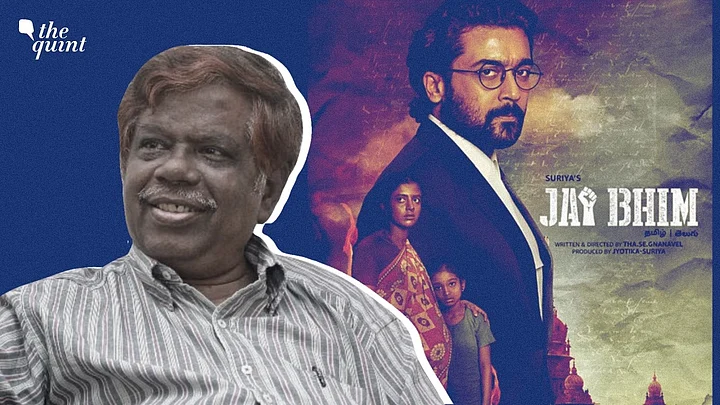Before we talk about the movie Jai Bhim, some context: Harvard economist Ricardo Haussmann says that many countries remain poor because the ‘collective know-how’, the knowledge that is shared by the society, is inadequate to produce complex value-added products and compete in the world market.
Thus, societies – and countries – with higher ‘shared knowledge’ are richer and the others are poorer. Shared knowledge increases with ‘knowledge spillovers’ that happen when people interact with people from diverse backgrounds. These interactions are believed to be one among the many reasons for higher economic growth in the cities.
A society with less barriers will have high number of interactions and vice versa. So, countries with more social inequality (with more barriers, like in India) will have less interactions, thus, less ‘knowledge spillovers,’ resulting in poor economic development.
Jai Bhim Is a Step in 'Killing the Caste Monster'
Countries with high social inequality, like India, will do poorly in economic growth – and we are witnessing it. It’s a no brainer that the fountainhead of inequality in India is caste. As Dr BR Ambedkar said, “Caste system is not merely division of labour. It is also a division of labourers.”
Dr Ambedkar also put it very clearly that "turn in any direction you like; caste is the monster that crosses your path. You cannot have political reform; you cannot have economic reform unless you kill this monster.”
Jai Bhim is one such step in killing this monster. Though the movie is primarily about the atrocity and oppression that the State inflicts on the poor and underprivileged, the essence is caste; the caste-driven inequality. And the rule of law that is thwarted by deep fissures and hierarchy that is primarily sustained by caste and its twin sister, patriarchy.
I am happy that the movie does not fall into the trap of a communist or Maoist ideology of an armed uprising against the State, but treads the difficult, but right path of taming the State with the available legal instruments.
Representing an Angrier Version of the Oppressed Than Before
Suriya has given life and soul to the character of Chandru, an upright lawyer who does not flinch even for a second and holds that simmering anger against inequality.
Prakash Raj has aced his role as a conscientious senior police officer, part of the system. Lijomol Jose, who plays Senganni in the movie, stays in our mind as the tribal woman whose courage makes all the difference.
Her deep eyes penetrate us to question our comfortable silence on the inequality around us. In a deeper sense, momentous societal changes occur when the women stand up against the regressive norms of society.
Movies like Jai Bhim, Kaala, etc, represent the angrier version of the oppressed compared to the softer and nuanced version from earlier movie directors like K Balachander, Bharathiraja, Bhagyaraj, among others. A flat world will impose a close scrutiny of injustice and unfairness as such societies will struggle to compete and succeed.
It’s time that the public takes up a fight against inequality and oppressive social norms, with the courage and determination that Suriya displays in this movie. As someone said, he has gone beyond the character, with his words and expressions that appear to emanate deep within him.
Every lawyer, every official, every political leader can actually become advocate Chandru and fight the negative elements in a legal manner.
Government Should Be the Agent of Change
Indeed, the change has to come from the government system. Everybody in the government should realise that in this aspect they shall be the agent of change. They are mandated to do that. They are mandated to dismantle caste and treat all equal. If they can’t even do that, they don’t deserve to be in the government system which is run by the Constitution that proclaims equality before law and protection to the weaker section.
The society also should start the dismantling of the caste from the government. There should be zero tolerance towards anyone in the government whose vision is coloured by caste.
We need to do this for the sake of our country so that we can become a more equal society, so that we can become an economic superpower. If we are true patriots, we have to question and dismantle caste and patriarchy.
The option of burying our head in the sand is increasingly becoming dangerous for us, our country. Because a society that is not equal and is oppressive to its members, is never going to be strong and can never compete in this flat world. We are already ranking badly on most of the indices that matter. What more proof do we we need?
Will We Bring Out the Chandru in Us?
The arc of the universe does not bend towards justice automatically. It has to be bent. We need to do that. No one will do it for us. Suriya seems to be doing that both on the screen and off the screen. Kudos!
The last scene in the movie is the best. Advocate Chandru is relaxing with one leg over another and reading a newspaper. The daughter of Senganni wants to imitate him, like most of the kids imitate the elders. After taking the newspaper in her hand and reclining back, she stops for a second wondering if she can cross her legs with one leg over, an indication of confidence and equality. Chandru looks at her and encourages her with a smile. The kid completes the mime with confidence.
Will we bring out the Chandru in us?
(Manivannan P is a civil servant based in Bengaluru. He tweets at @Captain_Mani72. This is an opinion piece and the views expressed above are the author’s own. The Quint neither endorses nor is responsible for them.)
(At The Quint, we question everything. Play an active role in shaping our journalism by becoming a member today.)
